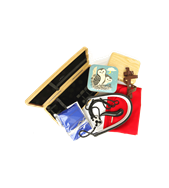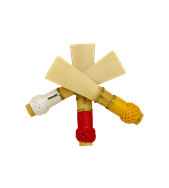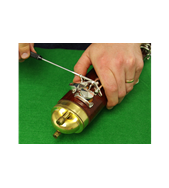How to look after your silver bassoon keys
June 7th, 2012

Schreiber 5091 key guard
One of the most obvious cosmetic differences between bassoons is the shininess of the keys. Some have very shiny keys; some do not. So what are they made of and what makes them shiny?
Generally, bassoon keys, like most woodwind instrument keys, are made of nickel silver. Nickel silver doesn't actually contain any silver - it's a copper alloy, containing copper, nickel and zinc. Nickel silver has a naturally shiny appearance very similar to silver; hence the name. In fact, it is rather shinier than silver (this is one of the ways you can tell if a key is silver coated or not).
Nickel silver is quite a tough and corrosion-resistant material; however, it can tarnish over time and can become pitted in extreme situations. Tarnish is a problem which can be remedied; pitting isn't so easy to fix.
Many bassoons have their nickel silver keys plated with silver. Silver tarnishes easily, first becoming dull and then showing black deposits. This black substance is silver sulphide, which can be hard to remove.
Silver tarnishes more quickly if it comes into sustained contact with the oily salts left on it by fingers, so it is important to wipe keys clean on a regular basis - especially if you store your bassoon for any length of time. It is always better to clean keys with appropriate materials and methods regularly, rather than letting the tarnishing go too far, making it a major job to deal with.
Please bear in mind, though, that silver plated keys should not be cleaned with materials designated for cleaning nickel silver, so make sure you know whether your bassoon has silver plated keys before cleaning. And be very careful when using any liquid or similar cleaners not to get them onto the pads, as they can ruin the pads' effectiveness, necessitating a trip to your repairer. A proper clean really requires removal of the keys from the bassoon and the pads from the keys, which is something only a repairer should ever attempt.
A bassoon which is regularly played and cleaned can last for decades without appearing tarnished at all. Everyone likes a shiny bassoon, so it is best to keep tarnish at bay by regular cleaning, and by giving your bassoon keys a quick wipe over every time you play it.
Article Author: Oliver Ludlow, In-House Bassoon Specialist and Director at Double Reed Ltd.


Meet the team


